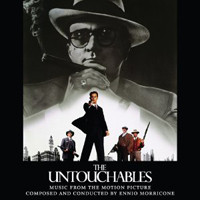- Composed by Ennio Morricone
- La-La Land Records / 2012 / 112:06 (score 55:24)
Brian de Palma’s The Untouchables was released to considerable acclaim in 1987 and is probably his most well-regarded film. With rising star Kevin Costner perfect as Eliot Ness, Robert de Niro hamming it up to high heaven as Al Capone and an Oscar-winning Sean Connery providing brilliant support as Jim Malone, the film is a great piece of entertainment. De Palma has always believed that music has a very important role to play in a film and as such, the scores for his films tend to be striking and very much at the forefront; and he’s worked with some wonderful composers including Bernard Herrmann, Pino Donaggio, John Williams, Ryuichi Sakamoto, Danny Elfman and others. On three occasions, he worked with the great Ennio Morricone.
The first of those was The Untouchables (with Casualties of War and Mission to Mars to follow in later years) and Morricone’s up-front, arresting music is quite brilliant. The score opens with “The Strength of the Righteous”, which introduces the main action theme (one of five major themes in the score), as electronic beats accompany a repeating five-note phrase heard on low-end piano and then strings, all with a wailing harmonica accompaniment. It’s a portentous opening to film and score – particularly dark yet somehow wonderfully colourful as well. Interestingly, of all the great melodic themes in the score he could choose from, when he performs the music in concert it is this dark action piece that Morricone chooses. The harmonica theme without the five-note accompanying figure is heard in the brilliant-but-brief “In the Elevator”. “The Man with the Matches” is another reprise of the material, this time filled with even more tension (and on the extended version of the album, appended with the brief “Nitti Shoots Malone”, adding a brilliant piece of anguished string writing to the end of the piece). The previously-unreleased “Courthouse Chase” is a brilliant variant on the material, on this album providing a good introduction to the familiar “On the Rooftops”, the score’s primary action cue.
The most attractive of the more melodic themes is undoubtedly “Ness and his Family”, a simply gorgeous, supersweet melody that seems to be a precursor to Cinema Paradiso, which the composer would score the following year. There’s also the cheerfully-named “Death Theme”, which has a jazzy tinge to it (this one feels like a precursor to Bugsy) from its introduction in “Ness Meets Malone” through to the full arrangement shortly before the end of the score. Al Capone gets a wonderfully comic theme (with wah-wah trumpets) which only appears a couple of times in the score, but certainly leaves an impression; it will probably sound downright silly to most people today but it does work fantastically in the film and is tremendously entertaining away from it.
The final theme is perhaps the score’s most famous. It’s briefly hinted at in “Ness Meets Wallace / Ness Meets Stone” before being fully unveiled in “Victorious” and is used by Morricone for the most triumphant moments of the film, including its most brilliant presentation for the end titles. Full of heroism, it’s a massive piece of music for the full orchestra, designed to get you off your chair and raise your arms in delight. It’s so utterly unrestrained, I doubt a Hollywood-based composer would ever have attempted anything like it. I imagine the end title piece would find its way onto a lot of people’s self-made Morricone compilations.
Two pieces of suspense music stand out. “Waiting at the Border” sees ever more frantic-sounding wind figures build gradually (gaining string and later brass accompaniment along the way) over a constant electronic pulse with percussive hits. Morricone’s suspense music isn’t always the easiest listening when taken outside the film, but this is brilliant. Then comes the astonishing “Machine Gun Lullaby”. Speaking as a Morricone fan, there are occasions when I hear a piece of music and just shake my head at the sheer audacity of it, unable to comprehend the creative process that could go into it. This is one of those. A children’s music box melody repeats endlessly with discordant accompaniment from the strings and later other sections of the orchestra to create a masterpiece of tension. It’s brilliant, it’s unique, it’s just so Morricone.
Brian de Palma is a wonderful director for film music fans, having the confidence to allow whichever composer he’s working with to really push things to the limit with their music. The Untouchables is a brilliant score, incredibly striking, full of great themes and other individual moments, and it’s amazing to look back at the film now and see just how up-front the music is in it (even de Palma might not get away with that today). All of that is great news for listeners to the soundtrack album, released in extended form in late 2012 by La-La Land Records; the new album is a significant leap forward from the old (Grammy-winning) one, which offered an excellent selection of cues but sequenced them in a bewildering order (starting with the victorious end titles, ending with the unresolved tension of “Machine Gun Lullaby”, it was very unusual). Even though many of the 15 minutes or so of previously-unreleased music don’t offer anything truly remarkable, they do provide an opportunity to hear greater development of the thematic material, and in this case sequencing the score in film order is of considerable benefit. The combination of highly attractive melodic themes with dynamite action/suspense material is a real winner and this is one of 2012’s essential soundtrack releases.
Rating: *****
facebook.com/moviewave | amazon.com












[…] Wave review 1 and review 2 by James […]
What was the song/music played during the murder of Malone?
Another Oscar-nominated score from Maestro Morricone, which is clearly written in his trademark style but done better in other scores of the genre. Here are my thoughts of the original album: http://italoscores.blogspot.com/2017/02/crimewaves-part-4.html